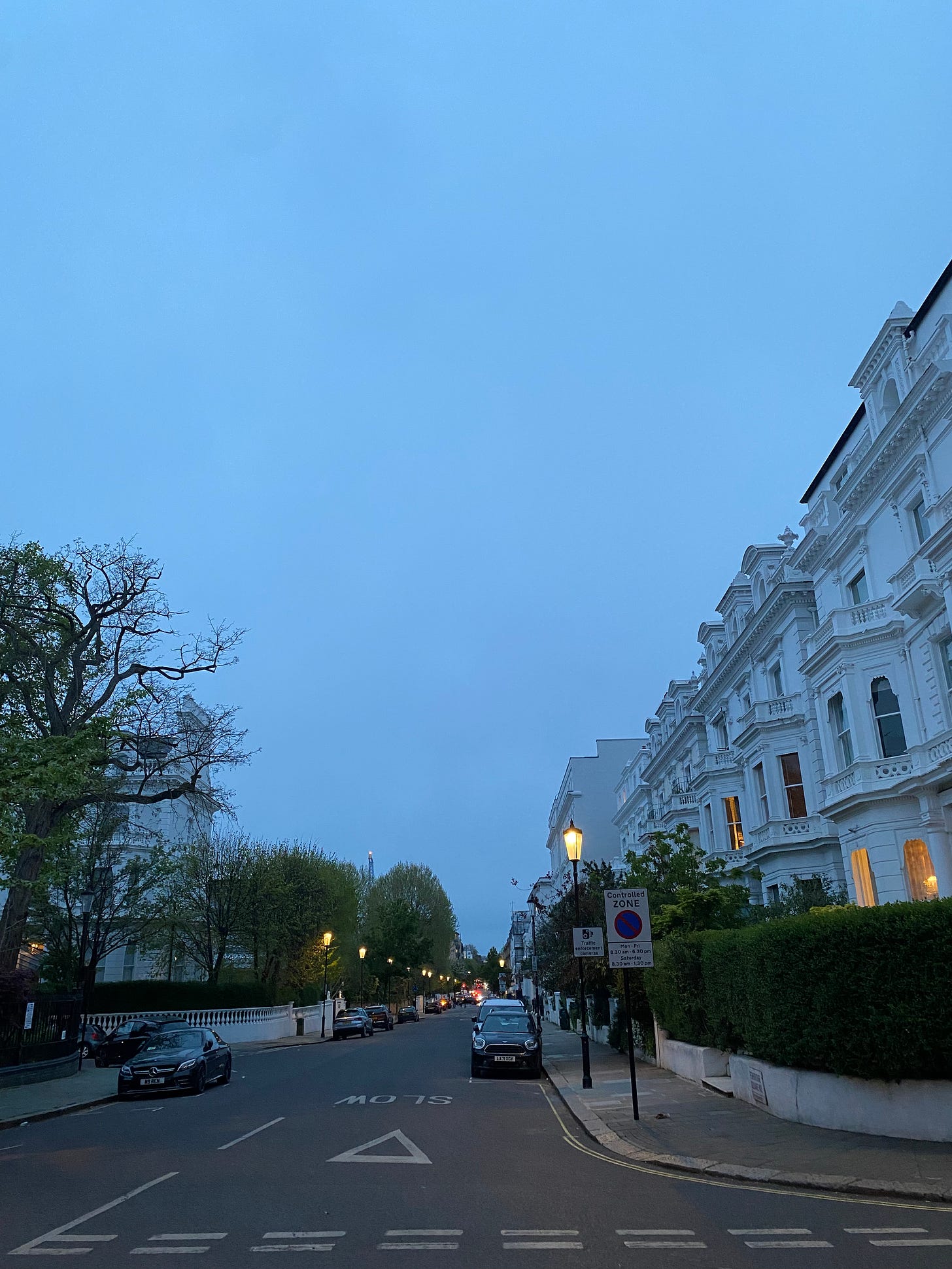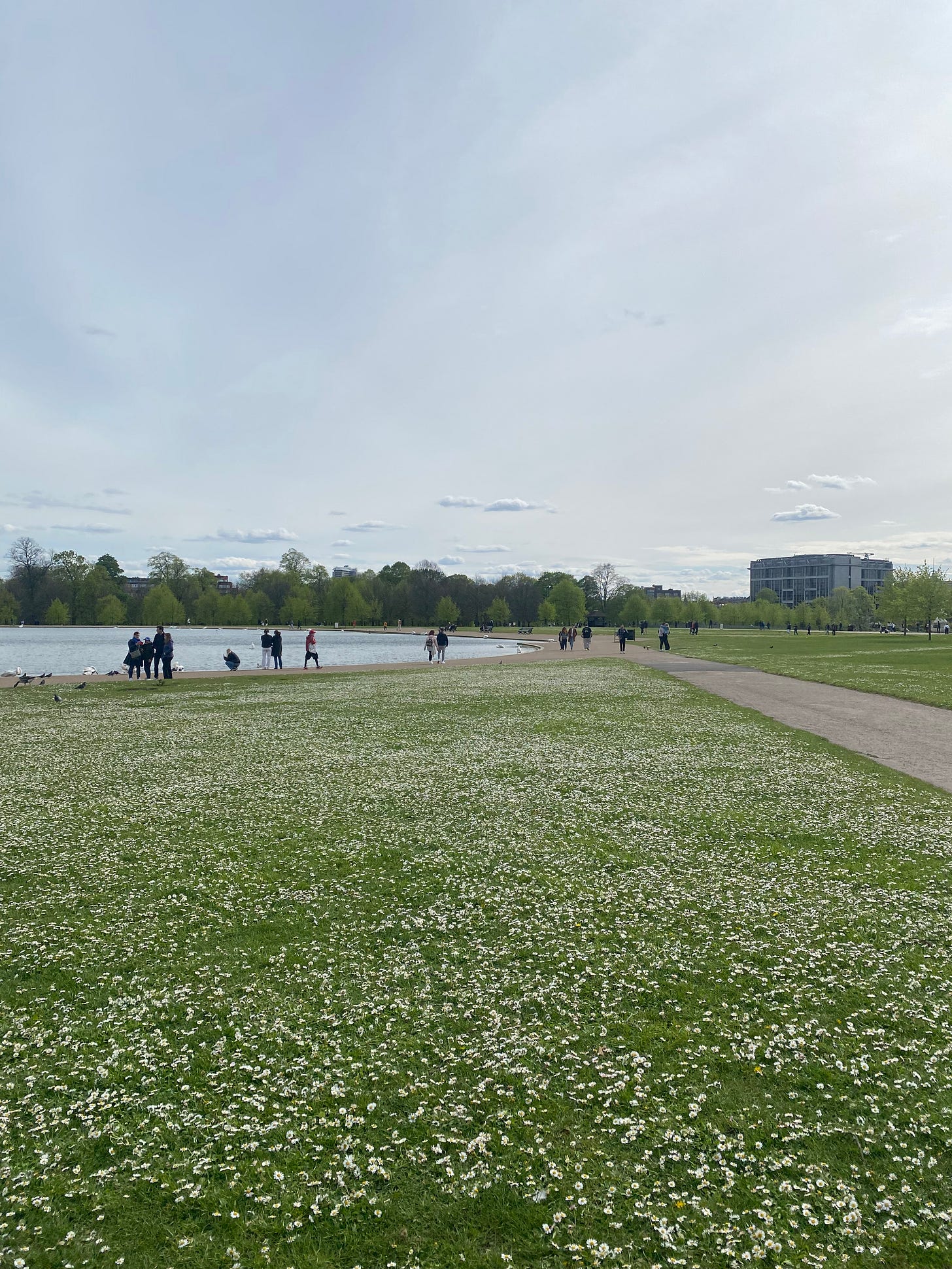in april, london is not blue
I looked up and saw the domed head of a church, the white statue of a prince, and the stern face of the Shard – who was I to pray to? Money, heaven, or monarchy?
Now I need to write quickly, before the heat of Bombay makes me forget how London blustered.
(I didn’t. I waited through the slop of summer. I waited through the blurriness of rain.)
I showed up to London a begging daughter asking for the big prizes. I knew it was an old city; during the Industrial Revolution, there had been sonnets about its chimney sweeps. I knew it was an important city; John Snow had mapped cholera to a water pump in Soho. I knew also that it was a strange city; even while its new empire of brown money turned racial history upside down, the economics still spoke in a straight line from slavery to steam to Sunak. Over three weeks in London, I waited to feel its age and importance and strangeness.
My first evening wandering around Chelsea and Kensington, I saw children in pinafores escorted by security guards, and pilates-bodies toting small dogs as furs. It was the end of April, and I was freezing. I’d hurt my knee a couple of days ago, and as the day aged endlessly, it stuttered at the fulcrum of my trousers and boots. I saw Blank Street iced matcha blueberry lattes and cars with cameras on them. Lining the hopelessly grey streets and manicured gardens, I saw white statues with gold encrusted to their threats. The Great Men of the statues stood stupidly, like a relative drunk when dinner’s been dead for hours. After three hours of walking, I sat down in a café of laptops to try to write with ink. Street names, towers, and spires. Their language so native on my tongue; I didn’t have much to say.
Over the next few weeks, I paced through central London, surveying palaces and classical architecture that looked neutralized, as if shot in the art by modernity. I couldn’t appreciate the monuments without thinking of how much more fertile these styles looked at home, decayed by sun and spat-out tobacco. Beside them, the office buildings gleamed lightlessly, named after tools and assets. Somehow, each one looked unoccupied. Of course, there were people, polite and clean, pale and upright, but they didn’t look alive. In history textbooks, we called them ‘Britishers,’ remembered between famine, jewels, and death. They seemed to expect my presence before I had even become.
(Somewhere, Homi Bhabha laughs.)
I knelt down in Daunt Books Marylebone, scraping its wood with the spoon of my hands, trying to find literature somewhere buried under all the totebags.
I stood atop Primrose Hill, watching a French family try to take the perfect photo. Their hair and their children kept flying away.
I eavesdropped on a first date in Chinatown, where a Rothschild scion condescended to a writer from Istanbul.
I drank beer at a pub and proved again that drink makes me sick; I can’t even blame the bitterness, because mead makes me sick too, and that is nothing but sweet.
On Saturday, I went to a club in Mayfair with heels and straightened hair. My friends and I bobbed beside a table of men we were assigned at the entrance. Every couple of minutes there would be an explosion of dry ice and a procession of bottle girls would emerge with sparklers and incomprehensibly, American flags. When the emcee (?) said, ‘if you’re here on vacation let’s hear it,’ I almost forgot to cheer. The next morning, we stood in line for brunch at Granger & Co in Notting Hill, where we would pay 16 pounds for a glass of orange juice. As we waited, hungover and cold, we pointed out nose jobs, lip fillers, and face lifts in the line; we counted Launer, Delvaux, and Hermès bags.
One particularly ambitious day, knee still rickety, heart still stagnant, I was to do a long museum trail. I mapped out my route and wore sensible shoes. As I walked by the water, thin slices of rain sluiced down onto me. The river and the rain were far from my warm cobalt monsoon, and they lacked even the moody drama of Europe. Instead, they were stern white sheets paling to an unrecognizably dim blue. Instead, they struck my eyes and my bones and my lungs in a kind of permanent tear. Umbrella lost to the pewter, I shuffled into Tate Modern.
The building itself was all cut lines and half-planes. It was nearly closing, and I had already been to three other museums that day, so I stuck to my must-see list. I saw Jackson Pollock’s The Yellow Island, and a David Hockeny splash. I saw Duchamp and Warhol. And then I saw IKB 79, the painting I was most excited about – Yves Klein’s ultramarine blue painting. It is a tableau covered entirely in one shade of blue that Klein went on to patent as ‘International Klein Blue’ (for even colour must be made an asset). In Bluets, a book that I bought at Daunt about loving the colour blue, the author Maggie Nelson goes to the Tate to see this painting. When she inspects it, she says: “I wrote but one phrase in my notebook: too much. I had come all this way, and I could barely look.”
I kept waiting for it to start – something, anything, a loose smile, a fallen leaflet – somewhere I could hear the city after weeks with my ear to its ground. Pale even in April, the streets felt indifferent at best, and ignorant at worst. Perhaps that was my answer. Perhaps it could smell my faked confidence like a dog. The problem with London was that if I squinted, it maybe looked like Paris. It was too proximate to too much from its people, to its pasts, to its plays. It reminded me of a home I could never return to – Delhi before October, my childhood games, bunk beds at camp, poetry written in Haussmannian buildings. A half-city with a dead imaginary, London came to me calcified. It was already over before it even began. I wasn’t visiting it, I was haunting it, with a bad knee and a weak stomach, too cold to light my cigarette and too anonymous to care about my face.
A few months before my trip, I had read a long investigative piece in the New Yorker about Zac Brettler, a 19-year old white boy from West (Central) London who jumped into the Thames in 2019. There was a sleet of ambiguity over how exactly it had all happened. Still, ever since he reached high school at a posh private institution, he had been pretending to be the son of an oligarch. He was entwined with notorious Indian billionaires like Akbar Shamji, who had an office on Berkley Square and Dave Sharma, who was, simply, a gangster. The article alludes to connections with the Ambanis, who declined to comment and threatened legal action if their name appeared. Accusations circled that Zac was in debt, caught up in fraud, and using heroin. His parents found a search for ‘witness protection uk’ on his iPad the week before he ‘jumped.’ The journalist writes of the city where Zac drowned: “London is the capital of pristine façades, often painted in wedding-cake shades of cream or ivory; the city’s dominant aesthetic is literally whitewash. As a 2021 report by the British think tank Chatham House put it, the U.K. is a “comfortable home for dirty money.””
The article seemed to implicate London itself in the death. London, turning lies into assets. London, with its buildings named after tools. London, freezing in April, and yet not blue.
Where was the sun? I looked up to find it and saw the domed head of a church, the white statue of a prince, and the stern face of the Shard – who was I to pray to? Money, heavens, or monarchy? There was nothing for me there, I couldn’t help feeling, wracked by the dissipations of modernity and too-rich-for-my-blood bodies. There were brown faces everywhere, but I felt no trace of possibility for myself. Staring at a brocade sari in the British Museum, a few aisles away from the Magna Carta, I thought, maybe empire never really happened. Maybe it was always already history. With this balding truth, I wondered, bundled up and flaking into the fog, what my escape route from the island was. Would I flee Kensington Gardens with a diamond in my nail and a lipstick boat for the Thames?
William Wordsworth grew into himself as London smoked out the Industrial Revolution. Wordsworth, like Nelson, and like me, felt overwhelmed by London and what its skyline meant for the world. He wrote the aching poem, ‘The World is Too Much With Us’ to freak through the city’s heavy-handedness during its economic explosion.
“The world is too much with us; late and soon,
Getting and spending, we lay waste our powers;—
For this, for everything, we are out of tune;
It moves us not.”
At a café outside St. Pancras, wearing leather boots and my vintage Prada, I asked the waitress if she knew where I could find a cheap packet of cigarettes. “You’ll have to leave Zone 1 for that,” she said wisely, but after looking me up and down, “just take some of mine for now if you like.” I took them, just to be a part of something. She knew I wasn’t leaving Central London quickly enough for a smoke.
It is April in London and I feel ambiguous. For this, for everything, we are out of tune; / it moves us not. Nothing itched my eyes except cold bones and punishing water. I rubbed them anyway. I had come all this way, and I could barely look.








